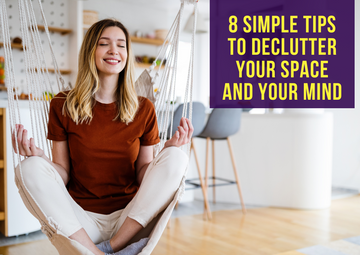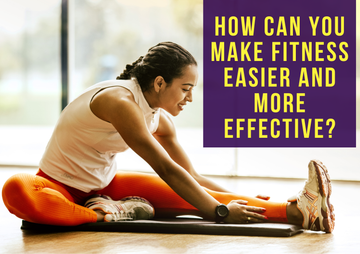8 Simple Tips to Declutter Your Space and Your Mind
It's no secret that a cluttered space can lead to a cluttered mind, leaving you feeling stressed and distracted. Decluttering not only frees up physical space but also creates mental clarity, allowing you to focus and breathe easier.
By taking small, intentional steps, you can transform your environment into a calming space that you enjoy and feel at peace in.
Here are 8 simple tips to declutter your space and, in turn, bring more tranquility and balance to your mind.
A 2011 Workspace Survey found that more than half of the 1,000 respondents claimed that disorganization at work affected their motivation and nearly a quarter said that clutter impacted their relationships with others. Many other studies have found similar correlations between tidy spaces and improved mood and overall wellbeing.
 Schedule some time for attentive deep cleaning:
Schedule some time for attentive deep cleaning:
Being in a clean and tidy atmosphere has an influence on our brain emotions, and even our health decisions. A clean and well-organized environment is beneficial on both physical and mental levels.
Clutter in homes and workplaces may cause anxiety and overload, and it can be difficult to think clearly when visual clutter overwhelms the senses. Making the time to consciously organize, clean, store, and remove unwanted objects and clothing may help to establish a tranquil atmosphere in which a busy mind can relax.
A calm mind produces better decisions, from what to eat to how to live. Here are some easy tips for achieving a clutter-free mindset and getting rid of a lot of clutter.
Have fun with it!
You will never take on the work if you keep thinking about how unpleasant it will be to go through and unload decades of clutter that you, your partner, and your children have accumulated over the course of your lives.
It will simply nag at you. Consider the pleasure of ridding your home of old junk from past times. It will be a lifted load and liberating to let go.
Have a clutter pal!
Trying to decide whether to keep your child's second grade drawings or the experimental crafts you created ages ago?
A buddy can assist you come to your senses and help you practice letting go. You can even ask help from your grown children.
Begin small and celebrate tiny victories.
When it comes to cleaning, you may go through your entire house, getting rid of any tangible objects that don't bring you joy, or you can tackle one tiny job at a time.
Our approach would be to go about small things that there is time for, such as organizing a shelf, a drawer, going through paper files and so on.
Recognizing the small wins throughout the day and handling small projects one at a time add up to more success versus tearing everything apart which may place you in a much more stressful place.
Start with your favorite areas or the tasks you've been putting off.
Do you have an overflowing closet, container, or shaky shelf that need attention? Consider how much better you will feel after this task is completed!
You may begin with your favorite or most-used areas, where you will undoubtedly notice and benefit from a neat and tidy atmosphere.
Keep things tidy as you go.
You want to deal with tidying on a daily basis. It is much simpler to deal with in the long term than doing it all at once at the end of the week.
It's challenging for us to feel peaceful on the inside if the outside is disorganized and untidy.
The 'undecided' box
For items you're not sure about keeping but can't throw away on the spur of the moment. You may become fatigued as a result of this.
However, if the box fills up too rapidly, you may have to check yourself and deploy your clutter buddy!
The three-year rule
If you haven't used anything in three years, toss it—this includes apparel, cooking gadgets, trinkets stashed in the basement, gardening equipment, and so on.
Chances are, no matter how cool the device or how memorable the clothing, it's not worth your space if you haven't worn or used it in three years!
Have a spare shelf or dresser that you've decluttered? Excellent work! Repurpose it if you can imagine a clear purpose for this newly liberated piece of furniture.
But if you're looking for an excuse to keep it-You may have to let go. You might be surprised at how liberated you feel!
Schedule some time for attentive deep cleaning. Start focusing on what you're doing, paying attention to the sensory experiences of movement and breathing as you go through your work list.
After that, enjoy some peaceful time at home, with everything in its place, all the things done and put away, and all the clutter gone.
Take note of how you are feeling and what you are thinking about.
Suggestions for integrating tidying and organizing with mindfulness, is to concentrate on the task at hand, whether it is organizing a shelf, doing the dishes, vacuuming, or putting away laundry.
Concentrate on the repeated activity, the way your hands feel as they hold the vacuum, the sensation of the water from the sink or the texture of the cloth you're folding on your skin.
If your thoughts begin to wander to what you'll eat for supper tomorrow night, take a deep breath, exhale, and return your attention to the physical sensations you're having.
And lastly, keep things simple!
Arm's Length: Everything you need on a daily basis should be within easy reach.
Cupboard: Do you need it on a regular basis but not every day? Keep it in a nearby cupboard.
Store it if you only use it once a year: This category includes something sentimental but not essential.
TRAINED Premium Quality Badminton Rackets, Pair of 2 Rackets
Check out our previous articles!
How to Get Started with Your Own Exercise Program
10 Benefits Of Working Out With A Friend!
How a 10 Minute Walk Can Improve Your Overall Well Being
6 Light Stretches to Help You Sleep Better
5 Simple Stretches to Relieve Lower Back Pain


















